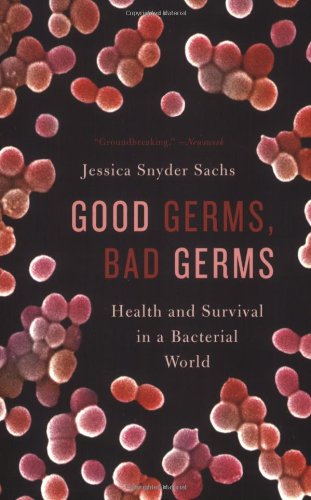In their first-year microbiology lectures. our students hear about Helicobacter pylori, the bacterium associated with the development of gastric ulcers (a discovery that eventually saw Barry Marshall and Robin Warren receive the 2005 Nobel Prize for Physology or Medicine). The trouble is, I suspect that this is all that they hear about a story that is considerably more complex.
The story of H.pylori is just one part of Jessica Snyder Sach's highly readable and thoroughly-referenced book, Good Germs, Bad Germs, which introduces the reader to the complexities of the human microbiome: the intricate microbial ecosystems found on and within the human body.
Good Germs, Bad Germs: health and survival in a bacterial world. Jessica Snyder Sachs (2008) pub. Hill & Wang. ISBN (e-book): 0809016427

The book begins with the harrowing tale of a young man's death from a rampant MRSA infection, and of a child living with multiple life-threatening allergies.- two tales linked by the unforseen effects of our overuse of anitbiotics and our fixation on hygiene. (Actually, the former was not entirely unseen: in his 1945 Nobel Prize lecture, Alexander Fleming commented on the possibility that overuse of penicillin could see the development of resistant bacteria. Unfortunately, at the time this warning went unheeded – if indeed it was really heard – for example, penicillin was available as an over-the-counter drug in the US for almost a decade after its introduction in the 1950s, which would undoubtedly have contributed to the development of resistant strains of microbes.)
Then, after an introduction to the "war on germs" and scientists' search for the 'magic bullets' that would (it was hoped) allow us to vanquish them forever, it's on to "life on man". Wherein I learned heaps, including the thought-provoking suggestion that there may be some adaptive significance to the fact that babies usually exit the vagina with their heads face backwards, towards the mother's anus. For babies guts are colonised by bacteria very soon after birth – & they may receive an inoculum of faecal matter on the way out, to join the lactobacilli from the vagina itself and bifiobacteria from breast milk.
Incidentally, while all this may sound uncomfortably germy, there's good evidence that the gut microflora are essential for survival. Lab animals reared in absolutely germ-free conditions, & whose guts never develop a microbial flora, fail to thrive. What's more, Snyder Sachs comments that the combined acction of several species of intestinal bacteria "liberate as much as 30 percent of the calories a person absorbs from food, especially from high carbohydrate meals."
Reading on – and it was really hard to put this book down! – you'll hear about the hygiene hypothesis, which suggests that many of the inflammatory diseases that plague us today are an unforeseen result of lives that are too clean. Along with this is the 'dirt vaccine': the idea that vaccination with a mycoplasma may help to redirect the overzealous immune response underlying many allergies. Then it's on to a deeper look at the development of antibiotic resistance and the rise of the superbugs, which has been exacerbated by the widespread use of antibiotics in farm animals. (Encouragingly, Snyder Sachs notes that banning this use, as in the Netherlands, can lead to a reduction in 'superbug' prevalence.) And finally, we look at our options for the future, and whether we can find a way to live in balance with our burgeoning microbial ecosystems.
And H.pylori? It turns out that this particular bacterium has been with us for at least 60,000 years, something that's been used to track human migration patterns that began when Homo sapiens first left Africa. H.pylori colonises the stomach in the first few months of life, before gastric acid secretion really ramps up, and can actually affect that acid secretion, lowering the pH enough that Helicobacter can survive but most other species are killed. There is a plus to this: the lowered pH reduces the effects of acid reflux & the development of oesophageal cancer. But then, there's those gastric ulcers – which apparently didn't really become an issue until the 1830s, when this was mainly a disease of the upper classes, possibly linked to a decline in colonisation related to improved sanitation and the use of early antibiotic products. And gastric ulcers
remain virtually unknown in undeveloped regions of the world such as Africa, where most people become colonised in infancy. It may be that delaying or disrupting H.pylori colonisation with water sanitation or antibiotics has somehow altered the immunological 'truce' that this microbe forged with our immune systems over thousands, possibly millions, of years.
I like the full, more complex story; it's so much more satisfying than the 'helicobacter – bad' version, and it's a much better reflection of the dynamic relationship between humans and the microbes that call us home.
ifthethunderdontgetya™³²®© says:
Good germs, bad germs, you know I’ve had my share…
~
Alison Campbell says:
haven’t we all? 😉
BBBB says:
Dr Martin Blaser delivered a lecture on H. pylori for the learning while intoxicated series I attend. Dr Blaser returned for a second lecture, tied in with his recently released book, Missing Microbes:How the Overuse of Antibiotics Is Fueling Our Modern Plagues.